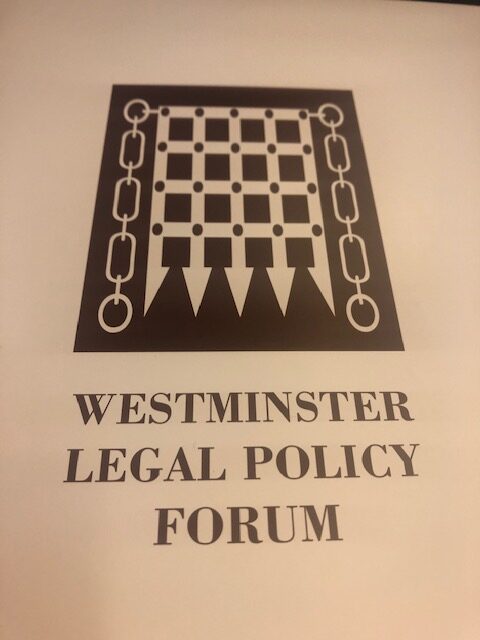Next steps for family law in England and Wales – reforming care proceedings, protecting vulnerable users and modernising court procedures
Sarah Phillimore, Barrister, St John’s Chambers
Published on 26th February 2020
11.25 – 12.05 Reforming care proceedings in England and Wales – Special Guardianship Orders, improving standards nationwide and innovative approaches to care
I was very pleased to be asked to speak today, but rather less happy about what I was going to use my five minutes to say. There is clearly information and concern enough about the current operation of the child protection system to fill five days.
So I thought it probably most helpful to set out my general concerns. Because, while all of these articulated identified issues and concerns are important, my worry is that without clarity regarding the underlying narrative of what drives state intervention with families, then much time and energy may be expended on reforms and alternations which do not have the intended consequences.
I will first explain my background and what I say gives me authority to comment in the way I do. I began to specialise in care proceedings around 1999. From 2011, I became increasingly concerned about the poor quality of public debate around these issues; sadly some of it generated by serving members of Parliament. This reached an apex for me in late 2013 with the case of the Italian national Alessandra Pacchieri who was subject to a ‘forced Caesarean’ after suffering a mental health breakdown on a visit to the UK – her child was later adopted. This generated a great deal of media commentary, some more accurate and responsible than others. However, it was clear that the ‘system’ did not cover itself in glory in the handling of this case and the visceral and terrified reactions of a fairly large sector of the public could not simply be ignored.
That prompted me to take more direct action; I set up my website Child Protection Resource Online and I organised over the years 3 multi disciplinary conferences where the aim was to bring together parents and professionals to discuss how the system was – or wasn’t – working.
Therefore for the past six years I have actively attempted to engage in dialogue with a great deal of people who have very varying perspectives on what the child protection system is FOR.
And the key difficulty appears to have emerged, in my view, that we have competing narratives that exist in tension with one another. I will deal with this fairly crudely given time constraints
The first narrative – and this is the one supported by successive governments – is that children are to be ‘rescued’ from neglectful homes, and placed for adoption in ‘warm loving homes’ with parents who will advocate for their children and support them, requiring less state intervention.
The other is that England and Wales are clearly outliers when compared to all other European countries in our willingness to make orders that permanently sever a child’s connection to his birth family. And that insufficient respect – or none at all – is paid to the rights of parents to be supported to care for their children. I see this particularly in cases involving parents with learning disabilities who, unless they have the benefit of supportive families are often simply unable to care for their children.
The narrative you embrace clearly has consequences for the direction of travel of care proceedings.
The example of Special Guardianship Orders is helpful and illustrative. The 26 week timetable together with various judicial warnings about the seriousness of a placement order has, without doubt, lead to SGOs being made on the basis of hope and crossed fingers. It is my view that a Supervision Order should never be attached to a SGO – this is supposed to be an order of permanence where the holder has ‘super PR’. It is simply illogical to suggest that it must be accompanied by a SO ‘to keep an eye on things’. If a SO is required, it suggests to me that the SGO should not be made.
This is in my view a direct consequence of the competing narratives. If we are fully committed to the ‘rescue narrative’ than frankly 26 weeks is far too long for most care proceedings, and as was envisaged by the original framers of the Children Act ,care proceedings could sensibly conclude in a matter of weeks. If however we espouse the need to provide families with more intervention and support then 26 weeks is no where near long enough.
How do we resolve this tension? I do not know. And happily I am not tasked with the very weighty responsibilities that fall upon law and policy makers in this room. But we will certainly not resolve anything if we can’t acknowledge it.
I would like to see greater awareness and discussion of what could be put in place to make care proceedings fairer, more accessible and less brutal for parents. Only this week I was pleased to read about the new assessment centre at Trevi House in Plymouth – if you don’t know about the work of Trevi House then I suggest you find out more. On Tuesday I attended a conference in Birmingham which discussed the success of parent advocacy programmes in the United States and what work was beginning to be done here with regard to use of such programmes and greater involvement of families by way of Family Group Conferences.
So I hope this provides some food for thought and a possible basis for further discussions.
Lived experience is great. But law and policy have to be based on facts. I hope I am wrong about my criticisms of the Family Justice ‘three’ month review and the way in which it has gone about gathering ‘evidence’.
Time, as ever, will tell.
Sarah Phillimore
26th February 2020

